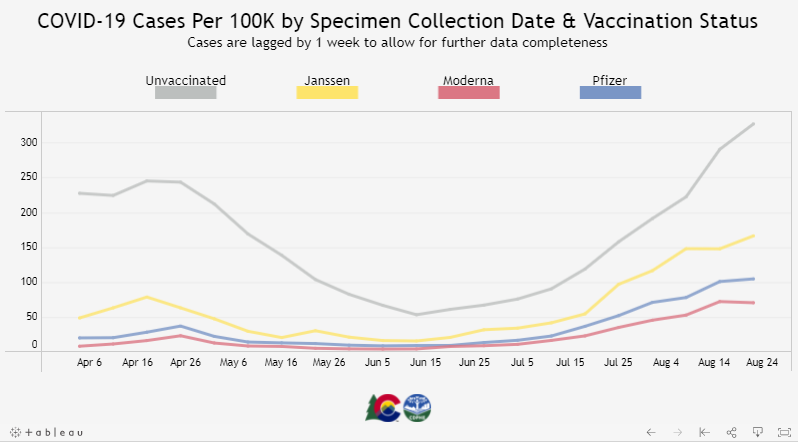Breakthrough COVID-19 cases are becoming more prevalent in Colorado

DENVER — The common refrain that we are living in a “pandemic of the unvaccinated,” while mostly true at one point, is becoming less and less accurate.
Yes, unvaccinated Coloradans still make up a vast majority of COVID-19 deaths in the state, indicating that the vaccines are doing what they’re designed to do. But fully vaccinated Coloradans are responsible for an increasingly substantial percentage of the state’s COVID-19 cases and hospitalizations.
The Colorado Department of Public Health and Environment (CDPHE) on Wednesday published a new web page that lays out data surrounding Colorado’s breakthrough cases. The charts show that breakthrough cases have climbed steadily since early June, albeit not as quickly as cases among unvaccinated people. Breakthrough hospitalizations are also on the rise. Deaths from COVID-19 among vaccinated Coloradans, thankfully, appear to remain flat.
The main reason for these breakthrough cases? “We have seen a decrease in vaccine effectiveness,” said state epidemiologist Dr. Rachel Herlihy during a September 8 COVD-19 update.
The highly transmissible Delta variant of COVID-19, combined with lessened pandemic-related restrictions on things like travel, gatherings and mask-wearing, are other reasons why breakthrough cases may have become more common. Herlihy said that the Delta variant is responsible for nearly 100 percent of cases in Colorado.
CDPHE’s new breakthrough cases web page also provides demographic data. Younger Coloradans—in this case, people between 20 and 50 years old—are overrepresented in breakthrough cases. For example, Coloradans ages 30-39 make up about 16.6 percent of the state’s vaccinated population. That same group, however, is responsible for more than 20 percent of breakthrough cases.
Herlihy shared a couple hypotheses as to why breakthrough cases skew younger: First, compared to older adults, younger Coloradans are more likely to be “out and about,” she explained, meaning they are more likely to be exposed to COVID-19.
The second hypothesis concerns the type of vaccine people received. As Herlihy recalled, older Coloradans were prioritized when the vaccines first became available. Only the Pfizer and Moderna vaccines were available at that time. By the time the vaccine was available to the general public (including younger people), the single-dose Johnson & Johnson vaccine was also an option. State data show that breakthrough cases are more common among people who received the Johnson & Johnson vaccine.
It should be noted, however, that out of the roughly 7 million doses administered in Colorado, fewer than 250,000 of them have been the Johnson & Johnson vaccine.
Breakthrough cases among Pfizer recipients are slightly more common compared to Moderna recipients. Pfizer doses make up well over half of all doses administered in Colorado.

Experts agree that booster shots could bolster protection against COVID-19, but it remains unclear when exactly they will become widely available. The Biden administration initially aimed to start delivering booster shots by September 20, but that plan is “facing new complications that could delay the availability of third doses for those who received the Moderna vaccine,” the Associated Press reports.
[Related: What to know about booster shots if you received Johnson & Johnson’s COVID-19 vaccine]
The head of the World Health Organization, meanwhile, said rich countries like the U.S. should pause booster shots at least through the end of the year and instead prioritize vaccinations for developing nations. White House Press Secretary Jen Psaki has said that is a “false choice.”
Kyle Cooke is the Digital Media Manager at Rocky Mountain PBS. You can reach him at kylecooke@rmpbs.org.